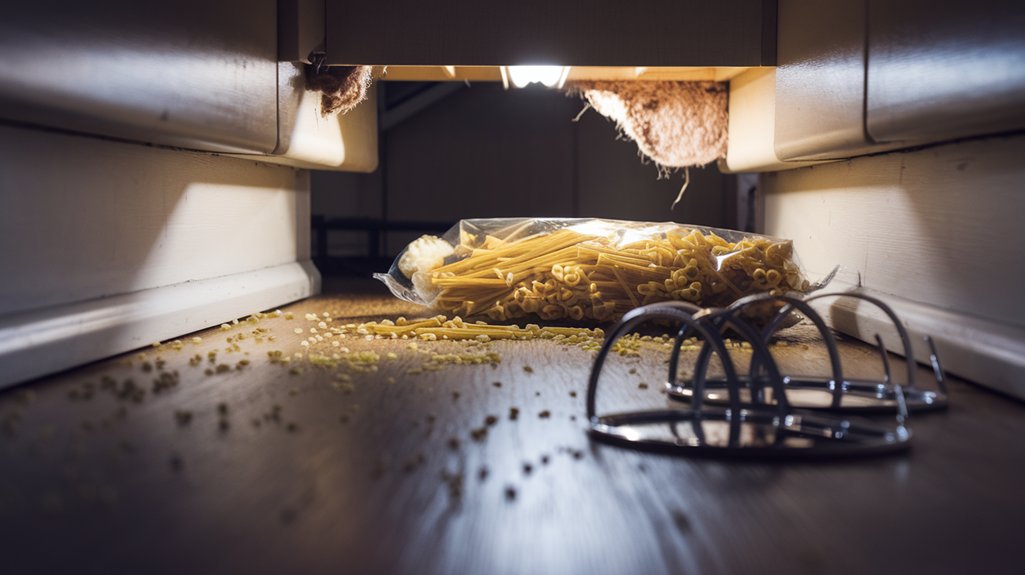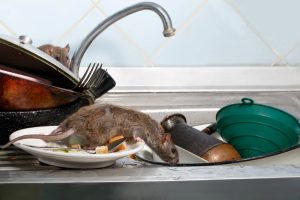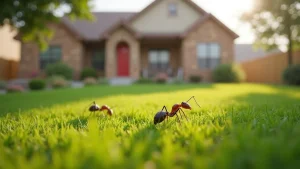If you’ve noticed signs that suggest a rodent problem in your home, it’s important to act quickly. Droppings, gnawed wires, and unusual smells can indicate an infestation that poses health risks and potential hazards. Strange noises at night might keep you on edge, and finding nesting materials could confirm your fears. Understanding these warning signs is crucial, but knowing what steps to take next can make all the difference. Let’s explore these signs further.
Droppings: The Telltale Sign of Infestation

When it comes to identifying a rodent problem, droppings are one of the most telling signs you can find. You’ll want to pay attention to their size and shape for accurate dropping identification. Rodent droppings are typically small, dark, and pellet-like, varying slightly among species.
If you spot these droppings in your home, it’s crucial to act quickly. They carry health risks, including potential transmission of diseases like hantavirus and salmonella.
Cleaning up droppings requires proper precautions, such as wearing gloves and a mask to avoid inhaling any harmful particles. By addressing the issue early, you can minimize health risks and prevent further infestation.
Don’t ignore these signs; take action to protect your home and family.
Rodent Infestation requires swift action. Learn pest tips from Colorado State University Extension.
Gnawed Wires and Chewed Furniture
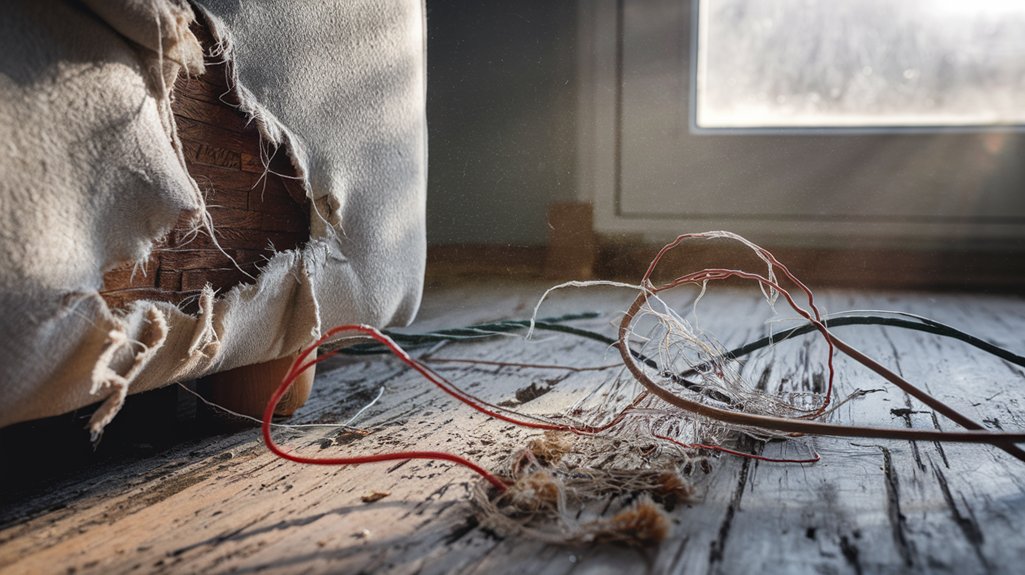
As you inspect your home for signs of a rodent problem, gnawed wires and chewed furniture can be clear indicators of their presence.
Mice and rats love to gnaw on various materials, including electrical wires, which poses a fire hazard. If you notice frayed wires or shredded insulation, it’s crucial to act quickly.
Additionally, check your furniture for bite marks, especially on wooden pieces. Chewed packaging around food items is another sign rodents are making themselves at home.
Don’t ignore these signs; take immediate action by sealing entry points and setting traps to eliminate the infestation.
Unpleasant Odors: A Warning Signal
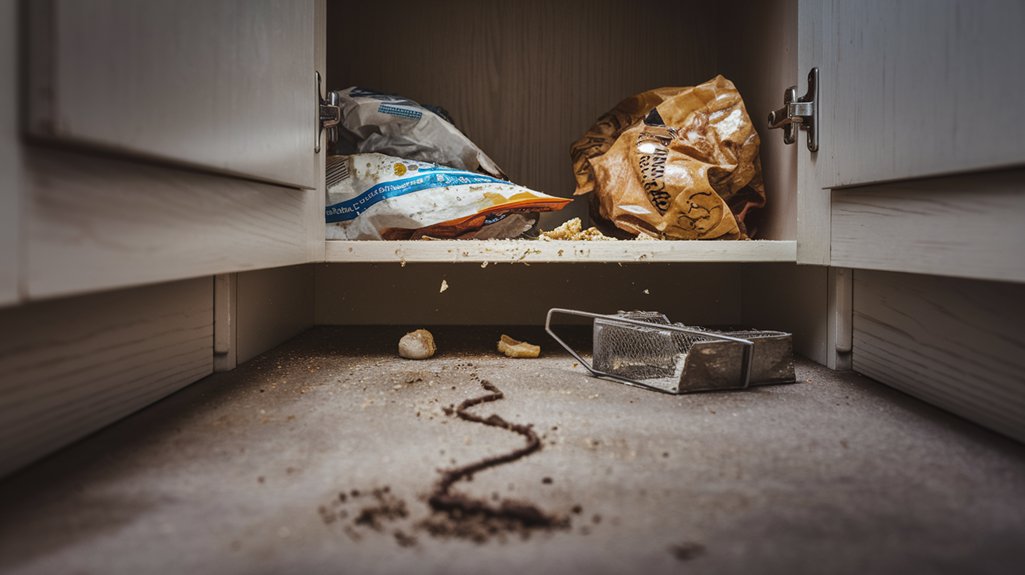
Unpleasant odors can be a strong indicator of a rodent issue lurking in your home. If you notice strange, musty, or foul scents, it’s time to investigate.
Rodent infestations often lead to the accumulation of waste, which can produce these unpleasant scents. Here are some common odor sources to check:
- Droppings: Rodent droppings can emit a strong, ammonia-like smell.
- Nests: If rodents have made nests from your insulation or other materials, they can create musty, stale odors.
- Carcasses: The presence of dead rodents can result in a powerful, rancid smell.
Act quickly to identify and eliminate these odor sources to prevent further infestation and maintain a healthy living environment.
Strange Noises at Night
If you hear strange noises at night, it could signal a rodent problem in your home. These sounds often indicate nighttime activity, as rodents are primarily nocturnal creatures.
You might hear scratching, scurrying, or squeaking noises coming from walls, attics, or basements. This rodent behavior is typically a sign that they’re searching for food or creating a nest.
Ignoring these sounds won’t make them go away; it can lead to a much larger infestation. To tackle the issue, first, identify the source of the noise.
Then, seal any entry points in your home, set traps, or call a pest control professional. Taking action now can help restore your peace and prevent further damage.
Nesting Materials in Unusual Places
While you may not expect to find nesting materials scattered throughout your home, discovering them in unusual places can indicate a rodent infestation.
Rodents exhibit strong nesting behavior, using various material sources to create their homes. Keep an eye out for these signs:
- Insulation – If you find shredded insulation in your attic or walls, it’s a clear sign of nesting.
- Fabric scraps – Rodents may use old clothes or towels from closets, indicating they’re making themselves comfortable.
- Food packaging – Finding chewed-up boxes or bags near your pantry suggests they’re using discarded materials to build nests.
If you notice any of these nesting materials, it’s time to take action and address the potential rodent problem in your home.
Frequently Asked Questions
How Can I Prevent Rodents From Entering My Home?
To prevent rodents from entering your home, focus on preventative measures like sealing cracks, securing food, and maintaining cleanliness. Rodent proofing your space ensures pests find it challenging to invade your living environment.
Are Certain Seasons More Prone to Rodent Infestations?
Yes, certain seasons are more prone to rodent infestations. As temperature fluctuations occur, rodents seek shelter indoors during colder months, making it vital for you to be vigilant about prevention strategies year-round.
What Health Risks Do Rodents Pose to Humans?
Rodents can transmit various diseases to humans through bites, droppings, or urine. You’re at risk for illnesses like hantavirus and leptospirosis. Taking precautions is vital to minimize exposure and protect your health from these rodent diseases.
How Do I Safely Remove Rodents From My Property?
To safely remove rodents from your property, use humane traps and natural repellents. Place traps in areas of activity, and apply repellents around entry points to deter them without causing harm. Regularly check and relocate trapped rodents.
When Should I Call a Pest Control Professional?
You should call a pest control professional when you notice signs of infestation, like droppings or gnaw marks. If you observe unusual rodent behavior, it’s time to seek expert help before the problem escalates.
If you notice any of these warning signs, it’s crucial to act quickly. Rodents not only pose health risks but can also cause significant damage to your home. Seal off entry points to prevent them from coming back, clear out any nesting materials, and set traps or call in pest control for professional help. By staying vigilant and taking these steps, you can reclaim your space and keep your home rodent-free.
Contact Us
Rodent Infestation is no match for Above & Beyond Services. Our Denver team provides pet-safe, effective rodent control. Call (720) 806-6378 or visit Above & Beyond Services for free quotes on rodent control, pest management, and more.
Key Takeaways
- Look for small, dark rodent droppings, which indicate potential health risks and require careful cleanup with gloves and a mask.
- Check for gnawed wires and chewed furniture, as these signs suggest active rodent infestations and pose fire hazards.
- Notice any strange, musty, or foul odors, which may indicate the presence of droppings, nests, or even dead rodents.
- Listen for unusual scratching, scurrying, or squeaking noises at night, typically originating from walls, attics, or basements.
- Find nesting materials like shredded insulation or fabric scraps in unexpected places, signaling that rodents are making their home in yours.

